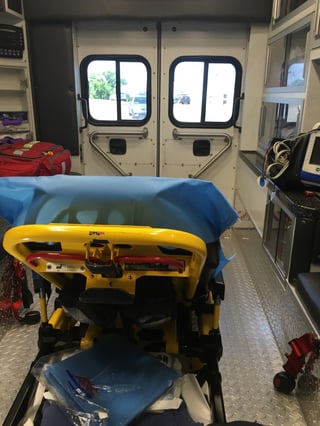How I spent my summer: Jacob Gunter

 For Jacob Gunter, summer break is far from a break. Instead of using the months off from school to relax, Gunter enrolled in EMT school and spends his days either in the classroom or out in an ambulance.
For Jacob Gunter, summer break is far from a break. Instead of using the months off from school to relax, Gunter enrolled in EMT school and spends his days either in the classroom or out in an ambulance.
Gunter, of Franklin, Tenn., is a sophomore double majoring in biology and chemistry, studying pre-med.
After hearing about EMT school, Gunter applied through Columbia State Community College.
“I wanted to gain patient experience and see what it was like,” Gunter said. “The state of Tennessee recently changed some things around and you have to do another semester of an Advanced EMT course in order to work on an ambulance, and due to being a full-time student at Trevecca I do not have time to complete this additional course. Therefore, I am using this class as patient interaction experience, and it is great medical knowledge for someone to know.”
The EMT program spans 10 weeks, stretching from May 31 through August 5. Over those 10 weeks, Gunter has spent three weekdays in the classroom learning and also worked to complete 96 hours of clinicals—eight days of 12-hour shifts on an ambulance.
When in the classroom, Gunter learns valuable skills to use in the field, like splinting, bleeding control or immobilization.
On his clinical days, Gunter arrives at the fire station around 5:40 a.m. and meets with the medics. The team typically starts their work by cleaning or restocking the ambulance in preparation for the day.
After this, Gunter’s day is determined by the calls the fire station receives, which does depend on which fire station he is at and that day’s weather.
“We average about five calls a day, so there is a decent amount of sitting around,” Gunter said. He spends the down time studying, waiting on the calls.
When Gunter and the team receive a call, dispatch tells them what happened and where, and they quickly load up and go.
EMT students sit in a captain’s chair in the back of the ambulance at the head of the stretcher, and so Gunter has a lot of patient interaction.
“It can be awkward at first to figure out what to say to a person while you are driving down the road to the hospital, but as time goes on it becomes easier and easier to figure out what to say to keep the patient calm and relaxed,” Gunter said. “Being taken to the hospital can be stressful, so I try my best to be kind and talk with the patients to distract from the pain they are experiencing.”
Once on the scene, the patient is treated, loaded onto a stretcher and taken to the nearest hospital, where care is transferred to the ER.
“As an EMT Basic student, I mainly just take vitals because the procedures done by the medics are out of my scope of practice,” Gunter said. “However, I can observe and assist the medics with things they ask me to do.”
Though it can be exhausting, Gunter is certainly thankful for the hands-on experience in the field he is pursuing a career in.
“This has reassured me that I want to be in the healthcare field. It is a great feeling to be able to provide care and relieve pain that someone is experiencing,” Gunter said. “I have questioned at times what I am called to do with my life, and what God has for me. This EMT experience has reassured me that I am doing what I am made to do.”